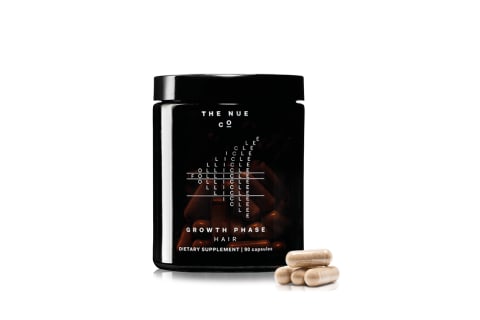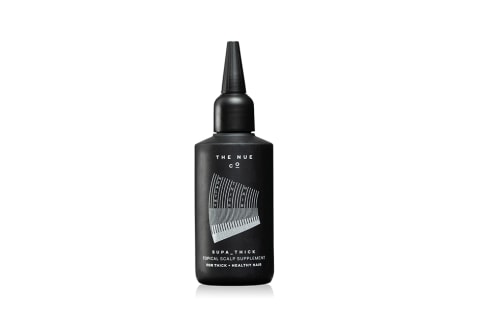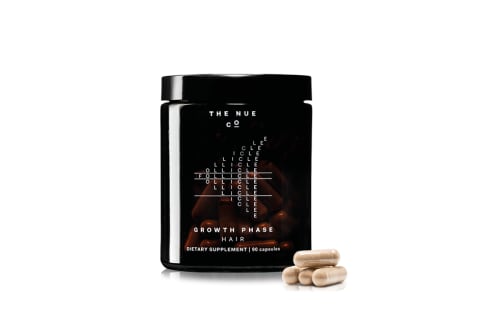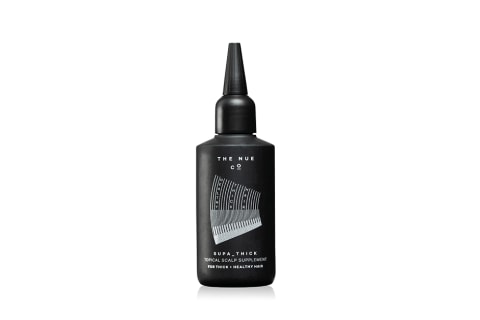Advertisement
The Top Four Things That You Need To Know About Hair Loss & Hair Growth

For most people, hair is an extension of their personality. Whether it's a sassy cut, a vibrant new color, or a messy top-bun, hair can say a lot about how we're feeling. That's why it's particularly frustrating when your hair doesn't act the way you want it to. If your mane is looking thin, while your brush is constantly full, you may find yourself anxiously wondering "is this hair loss normal?" You're not the only one asking.
Many women experience some degree of hair loss, but most don't know why it's happening or what to do about it. Once you understand the factors that can contribute to hair health, you can take actions to support stronger, thicker locks using solutions like The Nue Co.'s GROWTH COLLECTION.* Made up of an ingestible supplement and a topical aid, GROWTH COLLECTION is a two-step approach to total inside-out hair growth support—assisting with everything from hair shedding to hair thinning and slowed hair growth.*
Shop This Story:
Why hair loss happens.
By now we know that food, as well as our environment, can have just as much of an impact on the body as our genetics—hair included. Typically, the health of your hair doesn't take a hit for no reason. If you're experiencing unfavorable changes in your hair, it's likely due to a shift in your lifestyle, nutrition, or your surroundings. Here are four common offenders to look out for:
Stress.
No surprise here. In fact, can you think of the last time you had an issue that stress wasn't partially responsible for? Probably not. Stress affects hair growth because the stress hormone, cortisol, affects the function and cyclic regulation of the hair follicle. In layman's terms, when cortisol is high, the biological elements that assist in hair growth are reduced.
Nutrition & hormones.
Hormone fluctuations are notorious for interfering with hair health, which is why many women observe hair shedding during menopause and the postpartum period (i.e., when the female sex hormones take a major dip). The thyroid hormone is also frequently a culprit because thyroid health is largely involved in hair turnover1.
Nutrition and hormones often go hand in hand because proper nourishment is key to balancing hormone levels—but diet goes even further than that. Not only have nutritional deficits like iron and zinc been linked with hair loss2, but research has also shown that the gut microbiome plays a role in hair growth. The microbes in our gut help to modulate inflammatory pathways, which affects the health of hair follicles.

Pollution.
It's common knowledge that exposure to pollution is bad all around, but what's less talked about is the effect pollution has on our hair. In a 2019 study, researchers found that exposure to common air pollutants decreased the level of a specific protein in hair follicle cells responsible for fueling hair growth.
Product buildup.
Buildup—whether from oil, dirt, and sebum or from styling and hair care products—can lead to scalp irritation, which can lead to flaking, itching, and worse. Buildup around your hair follicles literally suffocates them and impedes hair growth.
What you can do about it.
Some of these factors are more easily tackled than others, but the first step is recognizing which may be affecting you the most. From there, you can work on finding ways to shift your lifestyle—for instance, managing stress through practices like movement, talk therapy, and meditation or improving nutrient intake and hormone levels through diet. But adding in some supplemental products can also support the process.*
For example, the Nue Co.'s GROWTH PHASE helps to moderate the body's natural stress response—and thus stress-related hair loss and thinning.* The formula contains adaptogenic reishi mushroom and eleuthero root extract, which promote the body's stress management and the leveling of cortisol levels.* GROWTH PHASE also contains all eight B vitamins, which assist in cellular energy as well as the health of our red blood cells, which carry oxygen and nutrients to the entire body including the scalp; you'll also find vitamins C and K, which aid in hair growth and encourage thick locks.* Plus the iodine, vitamin C, and vitamin B6 in the formula help to support hormonal balance.*
You can also add Nue Co.'s SUPA_THICK topical aid to your hair care regimen, which works to remove buildup and stimulate circulation to the hair follicles by gently cleansing and exfoliating the scalp. It contains a patented probiotic technology that repopulates and rebalances the scalp's microbiome—soothing, hydrating, and protecting the scalp from environmental aggressors.
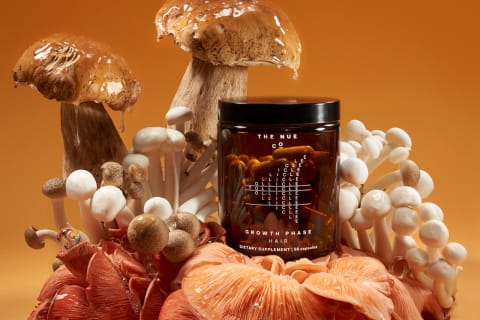
Reclaiming your locks.
Hair changes and loss can be an emotional experience, but it can also be temporary. Understanding the triggers, making the necessary adjustments, and adding in nourishing products—like The Nue Co.'s GROWTH COLLECTION—can help to steer you toward healthier hair.* With a newfound awareness and a little bit of supplemental and topical support, you'll be on your way to luscious locks in no time!*

